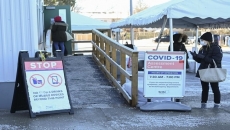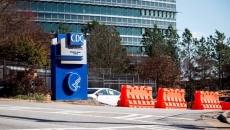Federal and provincial governments will stage a dress rehearsal Monday to test the complex plan to get precious COVID-19 vaccines distributed to every corner of Canada.
Maj. Gen. Dany Fortin, who was named last week to lead the Canadian military's role in the vaccine distribution process, says the dry run is intended to get everyone involved comfortable with the intense requirements of distributing a vaccine that has to be kept below -70 C at all times.
"We are hard at it in the next couple of weeks to ensure that we are ready," said Fortin. "I kind of like the idea of being ready before the Christmas time-frame so we are certain to be ready when it comes in January."
The first vaccine expected to get approval in Canada is from Pfizer and BioNTech and has to be kept at frigid temperatures until used.
Health Canada officials said Thursday the Pfizer approval is imminent with just a few documents left to receive from the company, including which lots of vaccine Canada will get. Deputy chief public health officer Dr. Howard Njoo said Thursday he fully expects the decision to be a yes.
On Wednesday, the United Kingdom became the first, and so far only, country to approve Pfizer's vaccine. The United States is expected to follow on Dec. 10.
The second vaccine in line for approval in Canada is from Moderna. It uses a similar messenger RNA technology but can survive in freezers that get down to only -20 C.
The difference means the two vaccines will be shipped and stored differently, requiring two separate logistical processes. Fortin said Pfizer will ship the doses directly to provinces and territories.
There are 14 identified delivery sites for Pfizer.
Moderna will deliver its vaccine to one national delivery site, and Canada is about to contract with a private logistics supplier to then move the doses to the provinces as required.
Fortin said the 14 Pfizer delivery points will be equipped and ready for vaccines to arrive by Dec. 14. The logistics contract for Moderna will be in place no later than Dec.15, he said.
Fortin said there have been "tabletop" exercises to plan the distribution over the last weeks, including one on Wednesday that involved more than 150 people from all 13 provinces and territories, and eight federal departments and agencies.
The Canadian Armed Forces received formal orders last week to start planning for the distribution of COVID-19 vaccines, though the military’s top commander says preparations have been underway for longer.
Fortin said the military has been involved on some level since the spring.
A planning directive issued last week by chief of the defence staff Gen. Jonathan Vance notes the possibility of having to pick up COVID-19 vaccine doses from the United States and Europe on short notice, and outlines concerns the military will be asked to help with distribution while also responding to floods and other emergencies.
The Public Health Agency of Canada has established a national operations centre to run the vaccine distribution but the Canadian Armed Forces will play a significant role under what Vance's order calls Operation Vector.
The military could be called upon to fly doses on short order from Europe, the U.S. or elsewhere, and to help get them to remote, northern and coastal communities.
Military planners are also preparing to have troops work at vaccine-storage facilities and deliver freezers and other medical supplies to various regions. But the military remains as much in the dark as everyone else about the specific timing for the doses to start arriving.
“The details of the Armed Forces’ plan become firm when we understand what support will be required by the provinces and territories,” Vance said.






